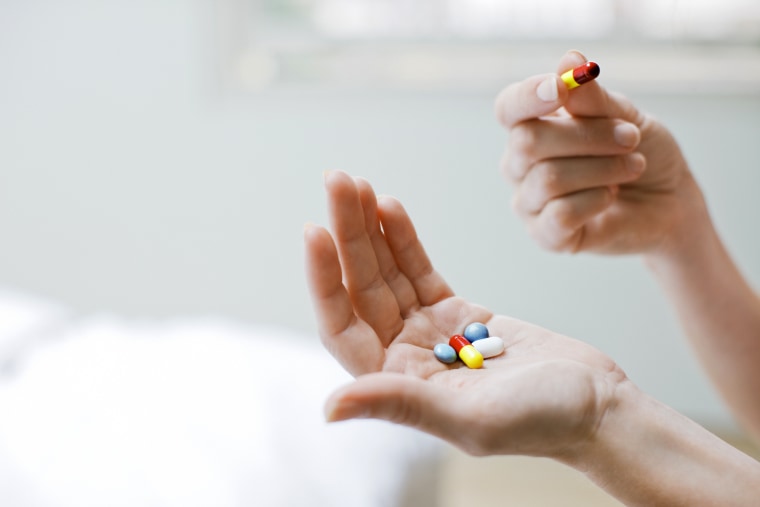Teenagers using dietary supplements to lose weight, gain weight or build muscle could be putting themselves at risk for serious harm and even death.
That's according to a study published Wednesday in the Journal of Adolescent Health, which looked at reports of health problems that occurred after kids, teens or young adults took vitamins or supplements.
The analysis included cases that had been reported to the Food and Drug Administration between 2004 and 2015. The study authors identified 977 such cases, 40 percent of which involved trips to an emergency room, hospitalization, disability or death. The remaining cases involved trips to a doctor's office.
And though both vitamins and dietary supplements were included in the analysis, the researchers found that supplements were responsible for the majority of the cases.
"Compared with vitamins, dietary supplements sold for weight loss, muscle building or an energy boost were associated with nearly triple the risk of serious health problems," said Flora Or, a researcher at the Harvard T.H. Chan School of Public Health and the study's lead author.
The study did not examine the precise ways the supplements and vitamins were ingested, nor did it look at specific ingredients.
But the authors suggest that there are two ways dietary supplements could cause harm: either they contained dangerous ingredients not listed on the label, or users were combining them with other supplements or prescription medications.
What's more, the researchers said that their findings could be an underestimate, because consumers may not always be aware that their symptoms are related to dietary supplements, or may not report those events to a doctor.
"Our paper is only showing a very small fraction of a very big problem in public health," Or told NBC News.
The study didn't look at what specific health problems resulted from vitamins and supplements. However, previous studies have linked supplements aimed at weight loss, building muscle mass or boosting energy with multiple health problems, including chronic diarrhea, dehydration, stroke, seizures, heart problems and kidney and liver damage.
Outside experts who study drug ingredients in the marketplace were not surprised by the new findings.
"No matter how you take a look at the supplements universe, these categories -- weight loss, sports supplements, special enhancement supplements -- keep on popping up," Dr. Pieter Cohen, an associate professor of medicine at Harvard Medical School, said.
Indeed, the FDA has issued warnings about some supplements sold for weight loss and weight gain.
But a trade organization for the supplement industry, the Council for Responsible Nutrition, maintains that the vast majority of dietary supplements are safe. "This article focuses on outlier products that do not come from responsible industry. CRN acknowledges that there is a problem with tainted, illegal products masquerading as dietary supplements, and urges consumers to choose products made by responsible companies who scrupulously adhere to the law," the group's CEO, Steve Mister, told NBC News in a statement.
Teens and creatine
One dietary supplement that can be particularly problematic for kids and teens is creatine, experts say. This age group has easy access to dietary creatine, which is marketed as a way to build muscle.
Creatine can cause dehydration, and some long-term studies in adults have suggested the supplement can lead to kidney or liver damage. However, there's virtually no research on its effects in teenagers. The American Academy of Pediatrics recommends against young people using performance-enhancing drugs and products, and in fact, labels on most products that contain creatine say they're not intended for people under 18.
But that doesn't stop retailers from selling them to teens, and it doesn't stop teens from buying them.
"It’s not illegal to sell these products to kids under age 18," said Dr. Ruth Lynn Milanaik, a specialist in developmental and behavioral pediatrics at Cohen Children's Medical Center in Hewlett, New York.
"Your 7-year-old could legally buy creatine," Milanaik told NBC News.
Milanaik was not involved in the new study, but has researched the way retailers sell the muscle-boosting supplement in the past. Her 2017 study published in the journal Pediatrics involved calling 244 stores that sell dietary supplements. One of her colleagues pretended to be a high school boy, asking store clerks what he could use to build muscle mass.
Sixty-seven percent of those clerks recommended creatine to the person they thought was a teenage boy.
"They were recommending a product for boys where it specifically says right on the label: don't give this to boys," Milanaik said.
What's more, adolescents may not be using such products correctly. "They tend to think, 'if one scoop is good, two scoops has to be better,'" she said.
Reputable doctors can best advise teenagers on the healthiest ways to build muscle, including a diet rich in lean protein, fruit and vegetables, as well as weight training.
FOLLOW NBC HEALTH ON TWITTER & FACEBOOK

